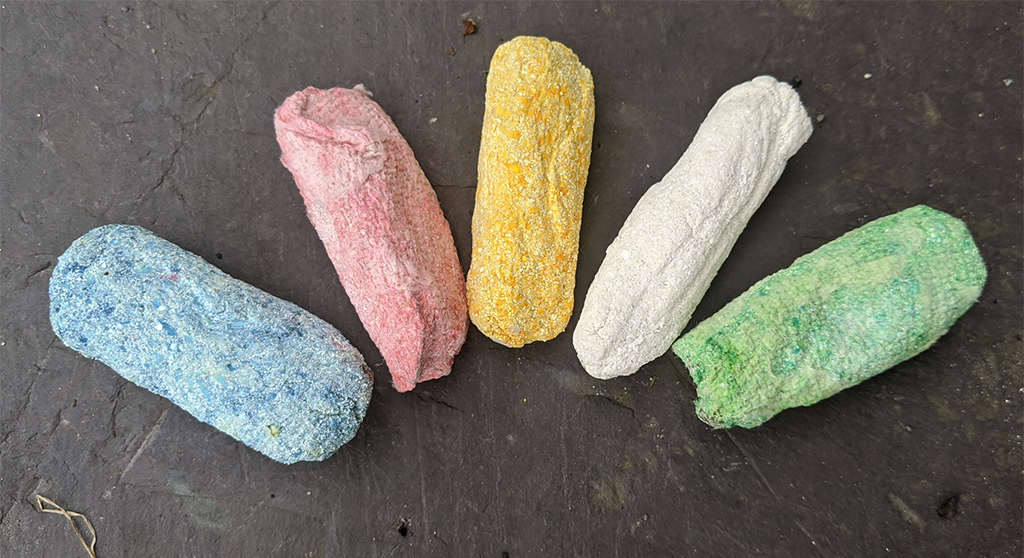Stovetop Alchemy: It’s time to get cracking turning your eggshells into sidewalk chalk

Eggshell chalk in use. (Photo: Suzanne Wong)
During these past two months at home I have found myself cooking more often and using a good number of eggs. I am making them for breakfast, using them when I occasionally bake cookies from scratch and adding them as the protein in my biweekly fridge-remnant fried rice (don’t want those little scraps going to waste!). The eggshells I’m left with are great for compost, but it would be even better to keep them out of the waste stream completely. Was there a way to keep these little calcium bombs out of the trash? A quick Web search revealed that I could easily turn my eggshells into sidewalk chalk – reducing my garbage, but also useful with the weather warming to make a game such as hopscotch or write words of encouragement for the neighborhood.
Eggshells are made from calcium carbonate, the same ingredient used to make antacids. Eggs are actually difficult to break – you can test this for yourself by trying to crush one in your hand or placing some books on top of a few eggs that are set upright. It’s rumored you can stand on top of a dozen eggs without them breaking. They’re structurally strong because their domed shape distributes the weight evenly across the shell, minimizing the stress at any single point.
Making sidewalk chalk is fast and easy, though grinding eggshells into a fine powder can be labor intensive. The easiest way is to use a coffee grinder. If you have one, simply pop your clean, dry eggshells in and grind them as you would coffee. You’ll want a fine power with no shell chunks. If you don’t have a coffee grinder, use a mortar and pestle or a thick zip-close bag and rolling pin to pulverize the shells. These alternatives require lots of elbow grease to get a smooth, fine powder. This may be a good time to get children involved!
Instructions:
 Cleaning and drying the eggshells: Make sure your eggshells are free of egg white/yolk. Wash the shells in a bath of warm water and dish soap. Rinse them well and set them on a plate to dry completely.
Cleaning and drying the eggshells: Make sure your eggshells are free of egg white/yolk. Wash the shells in a bath of warm water and dish soap. Rinse them well and set them on a plate to dry completely.
Eggshell powder: Using a coffee grinder, mortar and pestle or zip-close bag and rolling pin to crush the eggshells until they are a fine powder.
Making the chalk: For each stick of chalk, mix 1.5 teaspoons of flour with 1 teaspoon of water. Mix until combined. Add 1 tablespoon of eggshell and a few drops of dye. Mix well. The texture will be like clay. At this point you can form the chalk into a bar with your fingers or roll it in a small piece of paper towel. If using the paper towel, remove before drying. Repeat this process for each color of chalk.
Drying: Set the chalk on a plate to dry for five days before use. To speed dry, place the chalk in the oven at a low temp (my oven goes down to 170 degrees Fahrenheit) for 90 minutes and let dry for an additional 24 hours on a plate.
Enjoy!
Suzanne Wong is a resident of East Cambridge and a member of Cambridge’s Recycling Advisory Committee.



